#collaborativeeffect
Explore tagged Tumblr posts
Text
Teaching Artist Institute: “Children at the Center”
Tuesday, August 27th to Wednesday, August 28th at the National Building Museum, the DC Commission on the Arts and Humanities hosted a Teaching Artist Institute with co-hosts from the National Building Museum along with the DC Arts and Humanities Education Collaborative. There were 59 DC-based teaching artists who participated in a variety of sessions and workshops that were facilitated by 31 moderators, panelists, and staff volunteers. The “Children at the Center” Teaching Artist Institute focused on providing the opportunity for teaching artists to build skills and understanding in their field of teaching artistry.
TAI Resources:
Informational Flyer
Session Descriptions
Schedules at a glance
Day One
Day Two
Personal Bio Descriptions of Facilitators, Moderators, and Panelists
Tuesday, August 27th Agenda
1:30pm - Registration & Welcome
2:15pm - Keynote Panel: Children at the Center
3:30pm - Coffee Break
4:00pm - Workshop Breakout Sessions
5:30pm - Break - Journey to Shakespeare Theatre Company
6:00pm - Teaching Artist and Practitioner Speed Dating Networking Reception: Importance of Collective Impact, Hosted by DC Collaborative’s Any Given Child DC program and Shakespeare Theatre Company
Wednesday, August 28th Agenda
9:30am - Breakfast
10:00am - Keynote Panel: Program Design
11:15am - Morning Workshop Breakout Sessions
12:45pm - Lunch - Pecha Kucha Presentations
2:00pm - Afternoon Workshop Breakout Sessions
3:45pm - Keynote Panel: Assessment & Evaluation
4:45pm - Closure
Highlights: Tuesday, August 27th
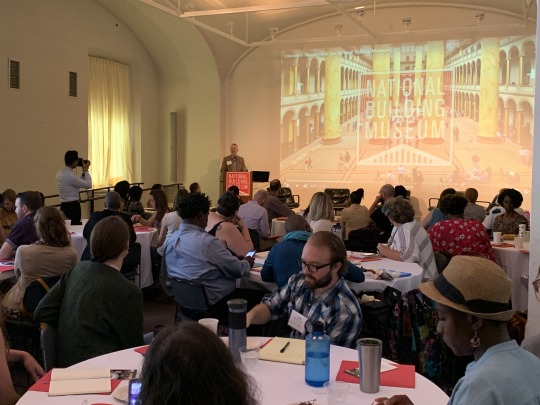
Keynote Panel: Children at the Center
The TAI began with a Keynote Panel. The panel was titled “Children at the Center: Addressing the Full Humanity of Each Student.” Panelists shared how they addressed the needs of the individual students they serve and how they broadly shape their programming around the unique needs of the communities in which they work. The Panel was moderated by Erika Hawthorne from Arts Education Partnership/Education Commission of the States featuring panelists Mary Brown (Life Pieces to Masterpieces), Kahina Haynes (Dance Institute of Washington), Tara Libert (Free Minds Book Club & Writing Workshop), and Christie Walser (Project Create).
Workshop A
Workshop A was facilitated by Jessica Valoris. Valoris is a DC-based multi-disciplinary artist who is a proud alum and Assistant Director of The Atlas Performing Arts Center’s City at Peace DC. The workshop was titled “Finding My Center: Devising Wellness in Community” and was targeted for teaching artists of teens and adults. This workshop focused on exploring holistic wellness practices that educators, artists, and young people can share to support one another.
Workshop B
Workshop B was facilitated by Lauren Wilson. Wilson oversees the Community Engagement team at the National Building Museum, which includes programming for teen and intergenerational audiences. Wilson’s workshop was titled “Co-Creating and Collaborating with Teens” which was directly targeted for teaching artists of teenagers. This workshop discussed strategies for sharing leadership and creativity with teens tailored to each participant’s individual work and practice.
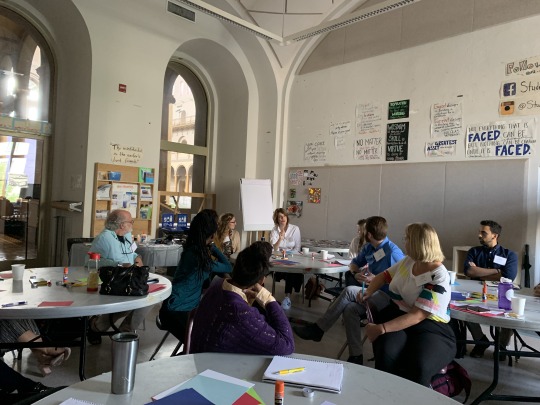
Workshop C
Workshop C was facilitated by Lindsey Vance. Vance is an artist, art therapist, licensed professional counselor, and educator. Vance’s workshop was titled “The Joy of Making Art: Intuitive Collage & Meaning Making” and was suitable for teaching artists of all ages. This session provided an understanding of the therapeutic power of visual arts through intuitive intelligence, experimentation, and narrative.
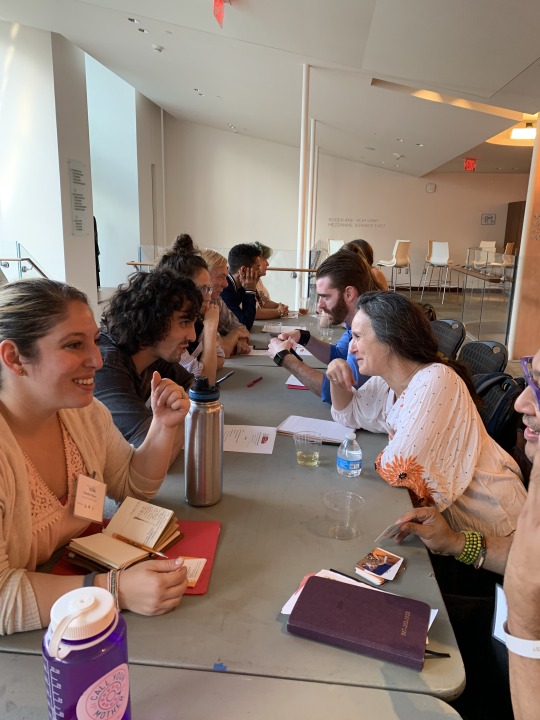
Collective Impact: Speed Dating
The DC Collaborative and Any Given Child DC held a Collective Impact Speed Dating workshop for teaching artists! Participants listened to why they should be involved in the Collective Impact Any Given Child DC work and interacted with their peer practitioners. Thank you to our host, Shakespeare Theatre Company!
Highlights: Wednesday, August 28th
Keynote Panel: Program Design
Wednesday morning began with a Program Design panel titled “Positioning Everyone for Success.” The panel was moderated by David Markey who currently oversees arts education programming for the DC Commission on the Arts and Humanities. Panelists included Kristen Anclien (Bridges PCS), Michelle Edwards (Live It Learn It), Peter Guttmacher (Consultant), and Mary Lambert (DCPS). This panel discussed important considerations to keep in mind in the design of in-school and out-of-school-time residencies.
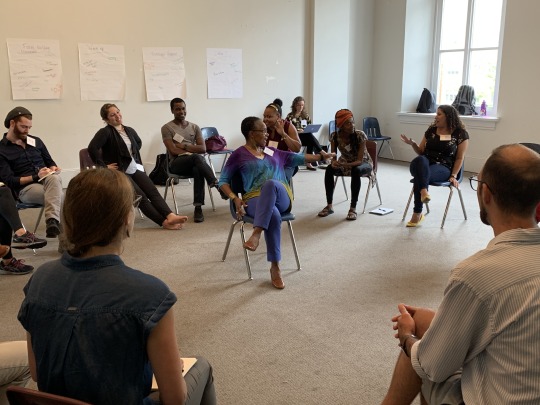
Workshop D
Workshop D was facilitated by Nikki Kaplan. Kaplan is the Associate Director of Education at Imagination Stage. Kaplan’s workshop was titled “Game Exchange! Tools of the Trade” and was suitable for teaching artists of all ages. In this workshop, participants exchanged classroom games, exercises, warm-ups, and technique/skill-building activities to add to their tool-kits.
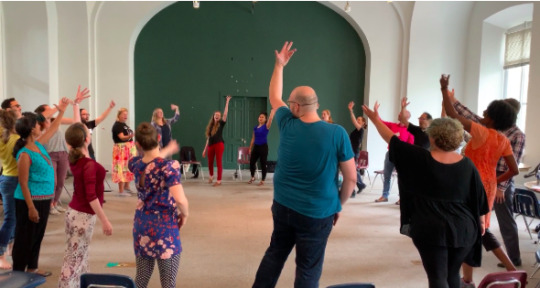
Workshop E
Workshop E was facilitated by nationally recognized master teaching artist Margot Greenlee. Greenlee’s workshop was titled “Dance and Theater Practice for Children of All Ages and Abilities” and was suitable for teaching artists of all ages. Participants learned collaborative methods that invite each child’s contribution, with special attention to supporting children with intellectual and developmental disabilities.
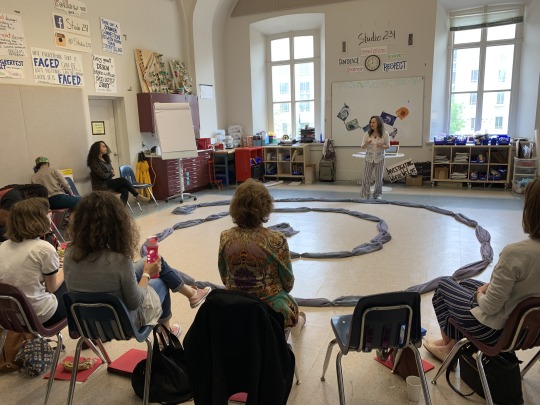
Workshop F
Workshop F was facilitated by teaching artists Sylvia Zwi and Marcia Daft. Zwi holds the position of Dean and Director of Early Childhood Arts & Professional Development at Sitar Arts Center. Daft is the founder of Moving Through Math and Teaching the Music of Language. This workshop was titled “Spiral Up (It’s in the “How”)” and was targeted at teaching artists of early-elementary but was applicable to all ages. Participants were introduced to seeds of movement and music ideas to provoke a student-generated response in semi-improvisational processes.
Workshop G
Workshop G was facilitated by teaching artist Imani Gonzalez. Gonzalez’s workshop was titled “Telling Your Story through the Blues” and was targeted for teaching artists of Grades 4-8. Participants explored the strategies that are aligned with Writer’s Workshop to engage in the composition blues songs that express thoughts, feelings, experiences, and then performed them.
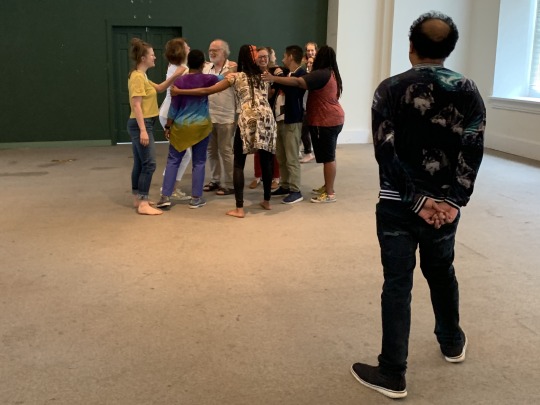
Workshop H
Workshop H was facilitated by Regie Cabico. Cabico is a poet and a spoken word pioneer having been the first openly queer and Asian American writer to win the Nuyorican Poets Cafe Grand Slam. Cabico’s workshop was titled “I’M BRAVE AS A MIGHTY OCEAN: INTRODUCTION TO SPOKEN WORD SLAM POETRY” and was designed for teaching artists of 6th grade and up, but could be modified for elementary school. Participants examined strategies to help students write through imagery and break down the components of slam poetry by demystifying the elements of a great slam poem through writing that addresses poetic devices.
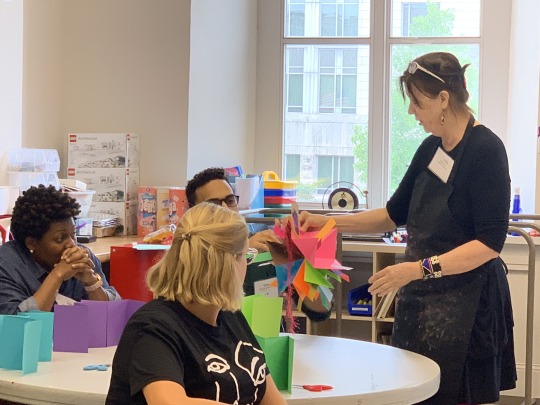
Workshop I
Workshop I was facilitated by professional teaching artist Karen O. Brown. Brown’s workshop was titled “Tricks Up Your Sleeve - for Every Teaching Artist” and was targeted for teachers of Pre-K 3 to High School. Teaching artists learned simple and effective techniques and processes to use with students. This included making handmade book structures (pictured above) and ways to use a variety of artistic expression to share strategies.
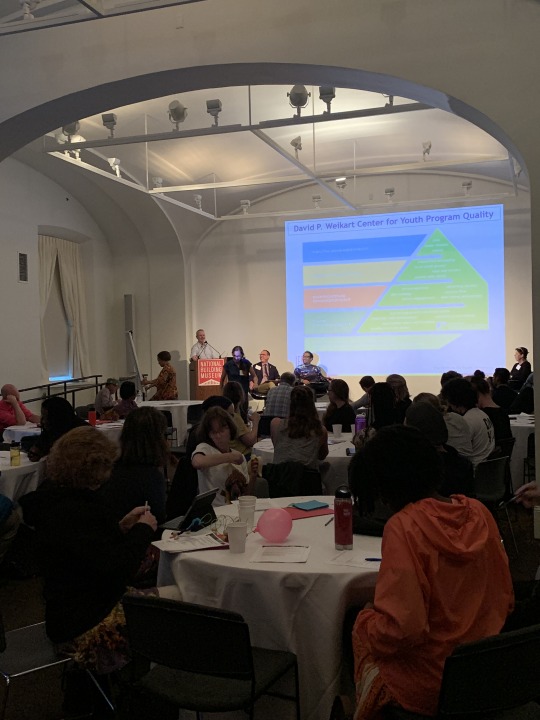
Keynote Panel: Assessment and Evaluation
The Teaching Artist Institute closed with a final Keynote Panel discussing Assessment and Evaluation titled “What is Quality? Really?”. This panel was moderated by Kevin Cataldo who is the Manager of the Institute for Youth Development part of the Office of Out of School Time Grants and Youth Outcomes as well as Office of the Deputy Mayor for Education. Panelists included Karen Brown, Regie Cabico, and Imani Gonzalez. This panel discussed the role that teaching artists play in the process of evaluating the quality and impact of programming and how can assessment be used for good.
Gratitude
At the Teaching Artist Institute: Children at the Center, attendees were not only able to gain experience and methods to bring back to their classroom but also learned strategies to better themselves as teaching artists. At this two-day event, the wide range of workshops, panels, facilitators, moderators, and panelists provided a variety of artistic fields for teaching artists to explore.
The DC Arts and Humanities Education Collaborative would like to thank the DC Commission on the Arts and Humanities, the National Building Museum, Shakespeare Theatre Company, and all of our facilitators, moderators, panelists, and volunteers for making this Teaching Artist Institute as successful as it was. We hope to continue to host more institutes for teaching artists in the future!
#CollaborativeEffect#ArtsEd#HumanitiesEd#DCArts#TeachingArtistInstitute#ProfessionalDevelopment#general news
1 note
·
View note
Text
Recap of Membership Meeting: Gratitude Edition
Submitted by Chin Wai (Rosie) Wong, DC Collaborative Membership & Social Media Communications Intern
June 30, 2021
Meeting Resources:
Meeting Notes
Meeting Recording - In case you missed it!
Meeting Powerpoint
DCPS Arts Website
GENESIS Virtual Campus
DC Commission on the Arts and Humanities Website
American Alliance for Theatre Education Website
DC Collaborative Community Glossary
Creative Spark Registration
July Membership Newsletter Submission
August Membership Newsletter Submission
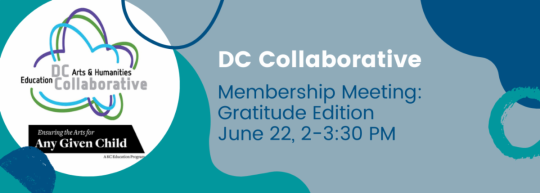
Meeting Summary:
On Tuesday, June 22, the DC Collaborative held a virtual Gratitude Meeting for members, staff, board members, and the committees to share updates and gratitude for the collaboration. The meeting began with an opening message from DC Collaborative Executive Director Lissa Rosenthal-Yoffe. Participants received updates from DCPS Arts, DC Commission on the Arts and Humanities, Education Programming, Steering Committee, Equity & Justice Subcommittee, Assessment & Evaluation Subcommittee, and the DC Co-Lab. Subsequently, the updates were followed by a meeting adjournment in which Lissa expressed her gratitude for all the effort of the board, committees, staff, and members, and shared her vision of a better-informed arts and humanities education of practice in the following year. Before the meeting came to an end, participants engaged in a networking session where they shared the highlights of their work this year.

DCPS Arts Updates:
DCPS Arts Director Mary Lambert expressed her gratitude for collaborative members who have helped make arts activities possible for students in the 2020-2021 academic year. One highlight that reflects the success of arts and humanities is the virtual reality GENESIS x Hirshhorn Museum, which showcases over 1,000 pieces of art submitted by students. The design of the museum is inspired by the nature and urban scenes in DC, and participants are able to enjoy their visit through an immersive 3D experience. This project has brought together students’ diverse voices as well as the unique views of DC. Mary also shared their 2021-22 plan, which includes in-person and virtual learning, before- and after-school programs, ESSER funds to support school reopening, current guidelines for the fall, students in grades 3-12 having 1:1 devices, class schedules back to normal, and new clearance requirements. External field trips will be planned accordingly after more research of covid exposure, vaccination, and transportation is conducted throughout the summer and when teachers feel more comfortable in physical space. Moving forward, DCPS Arts stands by CDC guidelines and continues to strive for providing safe and rewarding learning experiences for students.

As a part of the District of Columbia Public Schools, Office of Teaching and Learning, DCPS Arts works closely with all teachers, staff, and principals in the area of visual art, music, and performing art programs within the DC Public Schools.
For more information, please contact Mary Lambert at [email protected] or visit their website at https://www.artsdcps.com.
DC Commission on the Arts and Humanities Updates:
Experienced in arts administration with a passion for education, Alorie Clark has served the nonprofit arts sector for more than ten years. In today’s Membership Meeting: Gratitude Edition at DC Collaborative, she noted grant applications designed to support organizations and individual practitioners in arts and humanities education, and the American Alliance for Theatre & Education (AATE) National Conference.
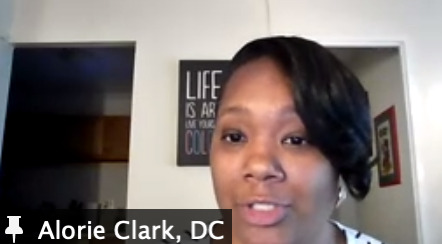
For more detailed information, please contact Alorie Clark at [email protected].
For DC Commission on the Arts and Humanities upcoming events, please visit: https://dcarts.dc.gov.
For 2021 AATE National Conference registration and more about AATE, please visit: https://www.aate.com/2021.
Education Programming Updates:
The Education Programming team at DC Collaborative shared their achievement in the past academic year. First, the School Partnerships Manager Ashlee McKinnon thanked students, schools, and teachers for collaborating with DC Collaborative, supporting our programs, and sharing the same value as arts education providers by prioritizing students’ development and keeping arts and humanities education alive.
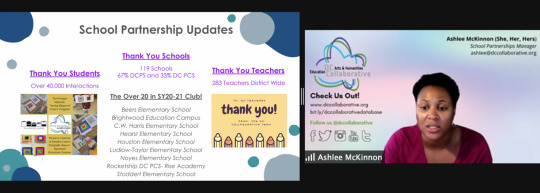
The Education Programs Manager at DC Collaborative Tres McMichael summarized the statistics of AHFES and celebrated the successful collaboration with consistent providers who made innovative programs and workshops possible for our students all over the District. AHFES recognizes the importance of working collaboratively and will continue to do so in the pursuit of reaching a national and international level.
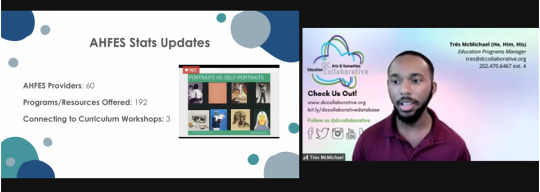
The Evaluation and Engagement Manager BoBeen Chung and School Partnerships Manager Ashlee McKinnon presented AHFES achievement through its assessment survey from teachers and students. The testimonials are valuable in strengthening the relationship among the DC Collaborative, teachers, and students, and supporting our strategic planning for future collaborations.
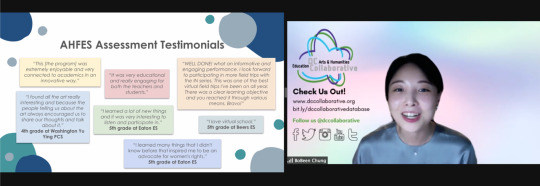
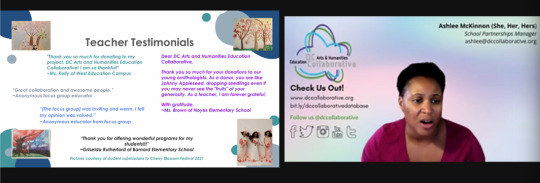
For more information, please contact:
Ashlee McKinnon at [email protected]
Tres McMichael at [email protected]
BoBeen Chung at [email protected]
Steering Committee Updates:
Deputy Director Tracey Wyton introduced the goals in the 2021 fiscal year at DC Collaborative. First, defining the community is crucial for working collectively, so we are developing this Glossary designed to have our staff, members, and committees on the same page. Moreover, we aim to articulate overarching questions to help reflect on our effort and share our best practices with other organizations. In addition, The DC Co-Lab is designed to put our data together and we are excited to invite you to participate in this strategic planning process.
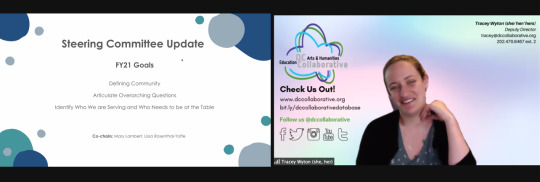
For more information, please contact Tracey Wyton at [email protected]
Equity & Justice Subcommittee Updates:
Co-chair Michelle Hoffmann and Jeanette McCune noted the prioritization of students’ and organizations’ needs by refreshing and reframing our work in accordance with social justice events. Our next step is to recognize how the pandemic has impacted people’s life experiences, to continue creating conversations in the community, and to create a new norm in this recovery stage while practicing JDEIA -- justice, diversity, equity, inclusion, and accessibility.

If you are interested in joining the Equity & Justice Subcommittee, please contact:
Michelle Hoffmann at [email protected]
Jeanette McCune at [email protected]
Assessment & Evaluation Subcommittee Updates:
Assessment & Evaluation Subcommittee Co-Chair Addie Gayoso, James Mitaritonna, and Wendy Wang Pisa emphasized fostering a collaborative environment by introducing meeting agreements, establishing a collective vision shared by the committee, gathering and sharing ideas to assist in our assessment, as well as taking advantage of DC Co-Lab to enhance community engagement, data collection, and analysis.

If you are interested in the Assessment & Evaluation Subcommittee, please contact:
Wendy Wong Pisa at [email protected]
Adrienne (Addie) Gayoso at [email protected]
James Mitaritonna at [email protected]
DC Co-Lab Introduction:
Community Partnerships Manager Wendy Wang Pisa introduced the DC Co-Lab platform designed to enhance engagement plans for DC Collaborative. It allows for data collection, data visualization, as well as better strategic planning for collaborative work. An example of the data visualization of the year 2019-20 is presented as follows.
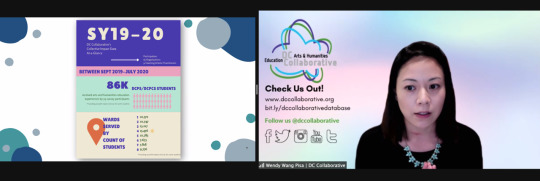
If you have any questions, please contact Wendy Wang Pisa at [email protected]
Networking Highlights:
When asked about the highlights of their work this year, participants shared the best practices in their organizations, which we can all reflect on and practice as we move forward. The strategies include conducting surveys of program participants, practicing flexibility and creativity in our work, being open-minded in trying new things, seeking silver linings, and bringing the genuine and honest self into work.
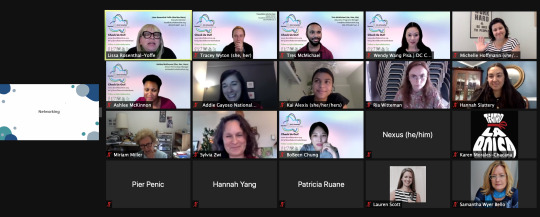
You Are Invited!
Celebrate the Creative Spark to help develop the creative capacity of children and youth in the district. The registration period for educators was June 14 - June 25, but the deadline has been extended. Matched programs will be scheduled between July 12 - August 6. Link to registration: https://dccollaborative.org/content/creative-spark
Please contact our Special Projects Consultant Kai Alexis at [email protected] for questions.
Stay Connected
In spite of the off-season for school, DC Collaborative communication continues throughout the summer. Please stay in touch with us and submit the content and news that you would like to share with the community in the upcoming newsletters.
For July membership newsletter submission: https://forms.gle/Yg7VPtdi8JjXB4B58
For August membership newsletter submission: https://forms.gle/ZkQ3avBhbfmHxWmC9
#general news#CollaborativeEffect#CollectiveImpact#ArtsEd#HumanitiesED#DCArts#Professional Development#Co-Lab
0 notes
Text
Center City PCS Explore “The Forensics of Espionage” at the International Spy Musem
Submitted by: Renee Stinson, Communications Intern, DC Arts and Humanities Education Collaborative
January 27, 2020
On January 24, 2020, students from Center City Public Charter School visited the International Spy Museum for a special workshop: The Forensics of Espionage, presented by Lucy Stirn. The purpose of the workshop was to show students the logistics of investigation, as well as to allow them to simulate the investigation process themselves.
Students were guided through a case based on a real one that occurred during the Cold War in which the FBI had been infiltrated by a mole. In order to discover the mole’s identity, they examined shoeprints, analyzed fingerprints, and compared handwriting samples. They were also taught about electrostatic detection, and shown how an ESDA (electrostatic detection apparatus) works to discover hidden writing.

Lucy Stirn shows Community ONE students how an ESDA works.
After the workshop, students were allowed to tour the museum, and I was granted the opportunity to speak to Lucy about the program. The primary goal of workshops like this one is to encourage critical thinking and problem solving among children and teenagers, and the way that the pseudo-investigation was structured around open discussion was meant to facilitate this. Lucy stressed the importance of getting students to be more observant citizens in the world—especially in DC, where the exchange of intelligence is everywhere.

Students discover a hidden message within a cipher.
Lucy hopes to continue to improve the program moving forward, as she believes that there is always room for any good educator to improve. To this end, for example, the museum will soon be adding a chromatography section. In addition, she wants more people to be aware of the opportunities that the museum offers to students. Even though it is not a Smithsonian Institution, the DCPS allows schools to coordinate field trips with the museum so that students can experience it for free. In turn, the DC Collaborative will continue its efforts to bring visibility to this opportunity, as it is one that would be a shame to miss—especially since instructors and students have expressed in the past that this is one of the most exciting field trips they’ve taken. As someone who got to see it all for myself, I can’t help but agree.
On behalf of the DC Collaborative, many thanks to Lucy and the rest of the education staff at the International Spy Museum for creating such a dynamic and intriguing learning opportunity for students and teachers alike.
#humanities#HumanitiesED#Arts and Humanities For Every Student#CollaborativeEffect#International Spy Museum
0 notes
Text
Professional Development Institute for Educators, “Unpacking a Safe Space”
Submitted by: Jake Hahn, DC Collaborative Programs and Communications Intern Tuesday, October 1, 2019
On Saturday September 21, 2019, teachers from DC public and public charter schools gathered at Friendship Collegiate Academy for a Professional Development Institute (PDI): Unpacking a Safe Space hosted by the DC Commission on Arts and Humanities and the DC Collaborative. This year the topic focused on trauma informed learning and creating a safe space in the classroom. With the multiple workshops available by grade-band, teachers had the chance to engage in activities that challenged them to step out of their comfort zones and get comfortable with their peers in interesting and fun ways.
PDI Resources:
Schedule at a Glance
Facilitator Bios
Session Descriptions
Agenda
9:00 a.m. — Light Breakfast and Registration
9:30 a.m. — Welcome, Opening Activity
10:30 a.m. — Morning Workshop Breakout Sessions
12:05 p.m. — Lunch
1:10 p.m. — Afternoon Workshop Breakout Sessions
2:45 p.m. — Group Activity
3:10 p.m. — Next Steps, Surveys, Raffles and Certificates
Highlights

David Markey, DC Commission on the Arts and Humanities opened the PDI with a short speech emphasizing the importance of the arts and humanities in public school systems, as well as, in the lives of the younger generations.

Lissa Rosenthal-Yoffe and a Friendship PCS student volunteer co-led an impromptu step-dance demonstration with participants.
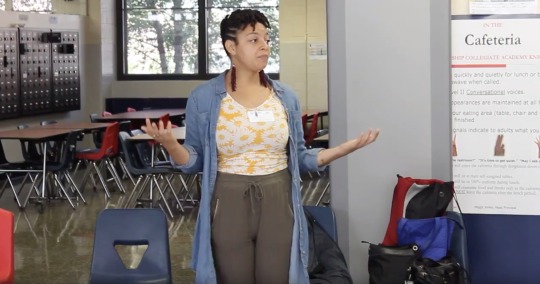
Jessica Valoris led a morning group session on what wellness is, and how to embody wellness in a classroom. During the session, Jessica led educators into multiple different activities; giving teachers tools to support mental, physical, emotional, and spiritual well-being
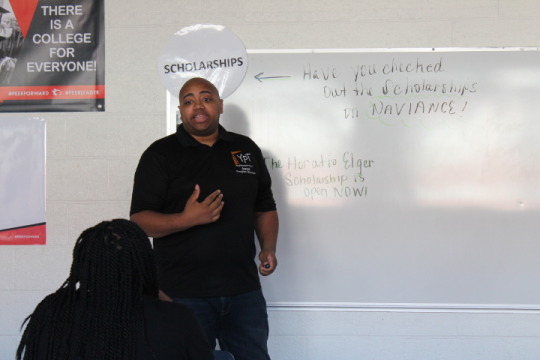
Jared Shamberger of Young Playwrights’ Theater led a trauma-informed care session for 3rd-5th grade educators entitled Seeing the Student.
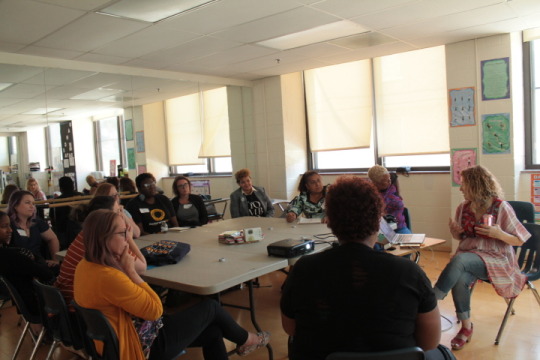
Lindsey Vance and Marla McLean led a group of Kindergarden-2nd grade educators on how to develop strategies using art, materials, and spaces to develop trauma-sensitive practices in classroom settings.
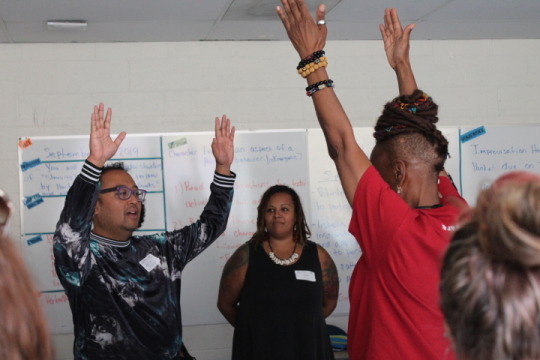
Reggie Cabico leading a group of 6th-12th grade educators using improvisation and mirrored movements. During this session, educators shared their memories in “story nuggets” and shared their personal stories with each other.
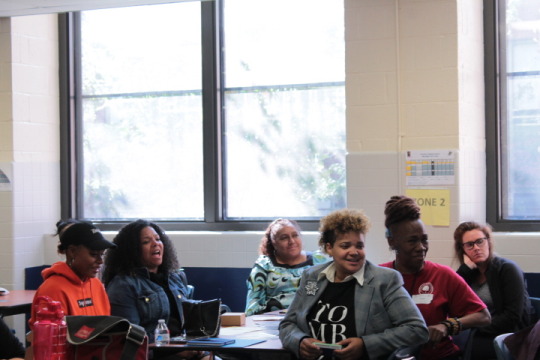
Lindsey Vance and ACE Fellow Mary Jo McCoy led a group session on how to use creative expression in the classroom to cultivate an emotionally safe environment. The workshop addressed many essential questions including: What does it mean to feel safe? What are the key qualities of a trauma-informed classroom?
A full listing of the sessions can be found here.
Gratitude
With the main focus being on the well-being of the teacher and student, many of the workshops allowed teachers to open up about issues they have faced with their peers and students. Lessons focused around the sensitive minds of the youth and how to create a comfortable atmosphere and personal connection between teacher and student.
Thank you to all the presenters and teachers for joining us for another successful PD Institute. To register for more PD events, please check out our website.
0 notes
Text
Recap- Any Given Child DC: Year-End Convening
Submitted by: Elisabeth Orengo, Community Engagement Intern, DC Arts and Humanities Education Collaborative June 12, 2019
A special thanks to everyone who attended the 2019 Any Given Child DC (AGC DC) Convening on Tuesday, June 11, 2019! This year-end convening was an internal working meeting for AGC DC committee members to learn about the individual committee’s activities and the Implementation year two plans.
This summer the DC Collaborative and AGC DC Steering Committee will be updating the committee action steps, solidifying a schedule for next year and conducting outreach for next year’s participation! View the meeting recap below. Questions? Contact [email protected].
Meeting Resources
Agenda
Any Given Child DC, Vision, Values and Goals
PowerPoint
Committee Descriptions
DC Collaborative/ Committee Roles

Meeting Welcome and States of Arts Education
A huge thank you to our host, the DC Commission on the Arts and Humanities, and David Markey in particular, who is a co-chair of the Capacity Building Committee and Fundraising Subcommittee. The DC Commission was one of the founders of the DC Collaborative and we appreciate their continued partnership in this collective impact work.

DC Commission’s (CAH) Executive Director Terrie Rouse Rosario and Deputy Director Michael Bigley, welcomed the AGC committee members and shared the CAH FY18 annual report (link).
Lissa Rosenthal-Yoffe, Executive Director of the DC Collaborative, then reviewed the agenda for the convening before to passing it off to Jeanette McCune, who gave an overview of the national perspectives of The Kennedy Center’s Ensuring the Arts for Any Given Child (AGC) program.
National Perspectives
A collective impact program of The Kennedy Center, Ensuring the Arts for Any Given Child (AGC) was launched 10 years ago, with it’s first site in Sacramento, California, and now involves 27 different communities. Although AGC’s collective impact model works across the nation, it is driven by the needs of the each community during strategic planning and implementation. Jeanette McCune highlighted the factor that makes DC unique among the 26 other sites, is the fact that the DC Collaborative, a collective impact organization, already existed when the AGC DC strategic planning work began in the 2017-2018 school year. AGC is a tool to implement collective impact strategies locally, and an organization like the DC Collaborative is sometimes an outcome for other communities.
Jeanette then discussed her time at the FSG’s Collective Impact Forum. FSG’s mission “to create a more equitable and sustainable future” was a source of inspiration for collective impact in the arts education field and Any Given Child in particular. Her main takeaway from the convening was that it is vital to gather, understand and effectively use information on “lived experiences” to drive change.
Local Update
Lissa Rosenthal-Yoffe provided an update for Any Given Child DC and described the DC Collaborative’s role as an early collective impact organization. AGC DC’s planning and implementation activities is the the work of the Collaborative and greater arts and humanities education landscape. We are excited that the community remains deeply committed to making arts education accessible for all DC students and will work together to align resources to ensure that we are reaching everyone together.
Committee Scope of Work
EQUITY/ ACCESS COMMITTEE (Co-chairs: Jeanette McCune, The Kennedy Center; Michelle Hoffmann, Washington Performing Arts)
Michelle Hoffmann read through the Equity and Access Committee’s goal, developed by AGC DC in the 2017-2018 strategic planning year:
“Eliminate barriers in order to ensure equity in arts education for all students.”
The committee’s first step this year was to create a Diversity, Equity and Inclusion (DEI) statement to guide the work of AGC DC internally and act as an exemplar to the community. Over the course of 3 meetings, committee members scanned other DEI statements from city agencies, other non-profits, arts and cultural organizations, chambers of commerce and foundations.
The committee aimed to draft a statement that connects to the mission and values of AGC DC, define diversity, equity and inclusion; gives local context about the inequities residents currently face; and discuss equity as a practice that our community is constantly learning and evolving from. Generating tools to build an equitable and empowered society is an ongoing process guided by mutual trust, respect and humility.
This statement will guide the work of AGC internally and will be an exemplar for other arts and cultural organizations in the District. The DEI statement is open for comment from AGC DC members through June 28. The DC Collaborative would like to share the equity statement with all members at the Annual Meeting in September. This statement will also be adopted by the DC Collaborative board
CAPACITY BUILDING COMMITTEE (David Markey, DC Commission on the Arts and Humanities; Nathan Diamond, The Kennedy Center)
The Capacity Building Committee had three meetings March-June. David Markey and Nathan Diamond decided to divide the upcoming work into two pieces, starting with professional development programs for classroom school-based educators and arts specialists and teaching artists. The capacity building committee will conduct a gap analysis to get an accurate picture of the current professional development landscape. Additionally they detailed two professional development institutes, one occurring August 27-28 for teaching artists at National Building Museum and one tentatively scheduled for September 21 for school-based educators.
The capacity building committee addressed that they would be waiting for one more year to address student programming.
ASSESSMENT/EVALUATION COMMITTEE (Anthony Setari, UMass-Lowell and DC Collaborative Consultant; Trisha Taylor, Washington Performing Arts)
The Assessment/ Evaluation Committee is working on three main projects:
Collection of assessment tools of arts organizations to determine the current state of assessment used by the community
Developing a shared measurement SEL tool to be used by arts organizations
Developing a logic model and evaluation plan for AGC DC
Trisha discussed that the committee will be collecting assessment tools used by arts organizations in DC. All of the tools will be kept confidential and will be used internally to inform the work of the committee.
Anthony reviewed early draft of an item matrix that will be used to develop a shared measurement tool exploring the impact of arts and social emotional learning (SEL). The committee is basing the tool on CASEL SEL criteria, because DCPS utilizes CASEL for their SEL work.
The assessment committee will begin to develop a logic model with co-chairs of the other committees.
COMMUNICATIONS COMMITTEE (JR Russ, National LGBT Task Force)
JR highlighted that the work of the communications committee will be ramping up this coming year. There was a delayed start as the other committees solidified their scope of work.
Some Communications Committee priorities for the upcoming school year:
Assist in recruiting a co-chair and additional community members, as JR will be transitioning from a co-chair to a Communications Committee member
Work with the Collaborative’s consultant at Deloitte to develop a communications strategy for AGC DC
Internal AGC DC communications- The Committee’s role will be largely for the external AGC DC communications. The DC Collaborative will work closely with the Communications Committee to improve internal communications among committees so our overall AGC DC work is less siloed. There will be a communications liaison on each committee that will work with the Collaborative to report out on their committee’s activities.
STUDENT/ PARENT ADVISORY COMMITTEE
(Katherine Custer, DC Collaborative; Joanne Lamparter, Imagination Stage; Tracey Wyton, DC Collaborative)

The committee co-chairs up shared activities from two meetings. The main focus of the committee is to determine a structure for how to utilize student and and parent voice in AGC DC. To better understand students needs, the committee drafted a student needs assessment and parent survey with the aim of determining the awareness and participation in arts activities currently and what support is needed from the community in the future. The aim is to distribute the surveys in the fall and have a student focused convening by December.
FUNDRAISING SUBCOMMITTEE (Lissa Rosenthal-Yoffe, DC Collaborative and David Markey, DC Commission on the Arts and Humanities)
Lissa and David shared that the formal fundraising work will begin as we develop specific AGC DC activities. The committee is now in the relationship building phase. They discussed a meeting with the Cafritz Foundation program officer and plans to engage Washington Regional Association of Grantmakers (WRAG) Children, Youth and Families working group, to involve the philanthropic community in AGC DC’s implementation. The Committee’s aim is to inform funders (including the Commission on the Arts and Humanities and the private sector) to developing grant opportunities that are reflective of the needs of the community.
#Collaborative Impact#CollaborativeEffect#social impact#any given child#Any Given Child DC#arts ed#humanities ed#dc#dc arts#202 creates#agc dc#general news
0 notes
Text
Meet the Music Manager at DCPS
Submitted by: Tessa Kay, DC Collaborative Membership and Collective Impact Intern
June 21, 2019
Meet Katy Weatherly, the new Music Education Manager for DC Public Schools:

Katy’s Background and Career:
Originally from Macau, Katy moved to New York City over ten years ago to further her music training. She graduated from Teachers College, Columbia University with a Doctorate Degree in Music and Music Education. Previously, Katy was an orchestra director, third-grade violin teacher, Pre-K music teacher at Teachers College Community School in Harlem. Katy was also an adjunct teacher teaching applied violin and viola lessons to graduate students at Teachers College for four years. She enjoys working with children as well as adults. Prior to her education degree, she earned a bachelor’s and master’s degree in viola performance at The Juilliard School.
Why Katy Supports the DC Collaborative:
Katy supports the DC Collaborative because it is at the heart of what she believes in; she is a firm believer in student-centered, collaborative, and constructivist teaching and believes music is a powerful vehicle to transform the lives of children, regardless of their cultural and social backgrounds.
More About Katy:
In her spare time, Katy enjoys making food and playing with her dog, Toby, who she adopted from Korea. Her husband, Chris, who is also a music teacher, will be working in DCPS in the coming school year.
#Arts ed#DCPS#DC#Music#Music Ed#CollaborativeEffect#collective impact#Arts and Humanities for Every Student#News
0 notes
Text
Artful Thinking #1: the “Palette”, a Set of Thinking Dispositions and Routines
Submitted by: Elisabeth Orengo, Program Intern, DC Arts and Humanities Education Collaborative
May 28, 2019
This page is the second publication of a series based on Artful Thinking: Stronger Thinking and Learning Through the Power of Art, the Artful Thinking project report, led by Principal Investigator Shari Tishman and research team members Patricia Palmer and Jessica Ross, and published in 2006. This section is dedicated to the process of art integration into curriculum. It provides an overview of a set of natural thinking dispositions that help consider the tie between art education and curriculum skills, as well as specific routines designed to enhance those inclinations.
According to the authors, who drew on the distinction between dispositions and cognitive capacities, established by Jonathan Baron in Rationality and Intelligence (1985), school curriculum traditionally values students’ “capacities factors like short term memory”, that “determine what in principle a person can do.” Moreover, students are regularly exposed to already established knowledge, and don’t experiment with the many opportunities to explore “the pattern of thinking that lead to these finished products” of thought. To offset these trends, the Artful Thinking Palette gives emphasis on the “dispositional factors (that) determine what a person does do within capacity limits.” The approach consists in encouraging students to identify the skills they use - whether during artwork exploration or other complex topics in the curriculum - and to ultimately transfer them from one context to another (p.7). Further, some routines leave students with questions, rather than answers, which is a powerful shift in understanding. As defined in Chapter 2: Artful Thinking Approach, this synergetic set of thinking dispositions is divided as follows: Questioning & Investigating, Observing & Describing, Reasoning, Exploring Viewpoints, Comparing & Connecting, Finding Complexity.
More than just strategies, thinking routines are the core of the Artful Thinking model, and an integral “part of the fabric of a classroom’s culture” that helps “students go about the process of learning.” To achieve this purpose, each routine is meant to (p. 14):
- Be oriented toward specific types of thinking
- Get used over and over again
- Consist of only a few steps
- Be easy to learn, teach, and to support when students are engaged in the routine
- Be usable across a variety of contexts, as well as by the group or by the individual
Routines are categorized by the specific thinking dispositions they individually support. A technical sheet corresponding to each item is available on the indicated pages.
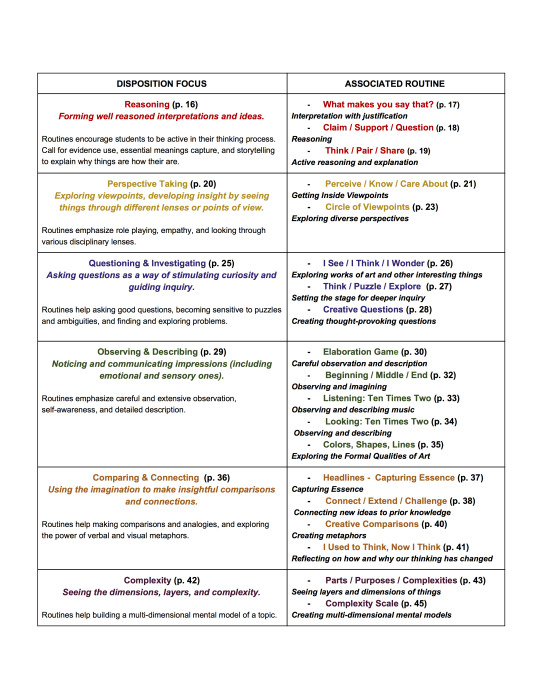
Have you ever made, or are you interested in making, use of the Artful Thinking Routines? Would you be inclined to implement them on a regular basis? Which one(s) do you feel the most confident in as tools to support your discipline and students’ needs? Please share your thoughts and comments!
0 notes
Text
Focus on Art, Books & Creativity at the National Museum of Women in the Arts
Submitted by: Elisabeth Orengo, Program Intern, DC Arts and Humanities Education Collaborative April 10th, 2019
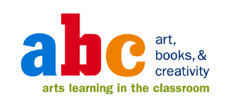
Created in the 1960′s with a collection exclusively dedicated women’s art, the National Museum of Women in the Arts (NMWA) has more recently became an authentic laboratory and research center for art education. Over the years, the institution has increased its collaborative efforts to build a diverse array of educational opportunities. In addition to its contribution to the creation of the DC Collaborative, of which it is a founder member, the education team at NMWA has built Arts, Books & Creativity (ABC), that is a comprehensive program aiming to facilitate art integration into school curriculum.
The DC Collaborative would like to share an overview of the series of accomplishments that led to the high quality programs currently offered at NMWA. We have asked Director of Education Deborah Gaston, and Senior Educator in charge of Arts and Humanities for Every Students (AHFES) at NMWA Adrienne Gayoso, to present the creation and the implementation processes of ABC programs.
Creation of ABC
Deborah Gaston explained that two successive grants, allocated in 2003 and 2006 by the US Department of Education, facilitated the creation of ABC. First conceived as an art integration program for students supported by a research component for educators to evaluate the impact of their work, ABC has now been combined with a professional development program based on teacher participation. Each year, NMWA offers summer institutes to help teachers from all over the country “integrate the visual arts into the core curriculum”. Further, an advanced institute has been created at the request of participants willing to go even further in their approach to art integration. Lastly, NMWA has set up online education resources to extend learning opportunities all over the country.
Visible Thinking Routines
ABC’s programs include some of the Visible Thinking routines developed by Harvard Project Zero. Originally established at Lemshaga Akademi in Sweden, Visible Thinking is a research-based initiative aiming to enhance students’ thinking dispositions across subject matters. This “extensive and adaptable collection of practices” enables students to make better use of their skills in a variety of contexts. At the National Museum of Women in the Art, educators “select methodologies based on the developmental level(s) of the audience, the works [they] show, and the habits [they] hope to introduce and habituate,” Adrienne says.
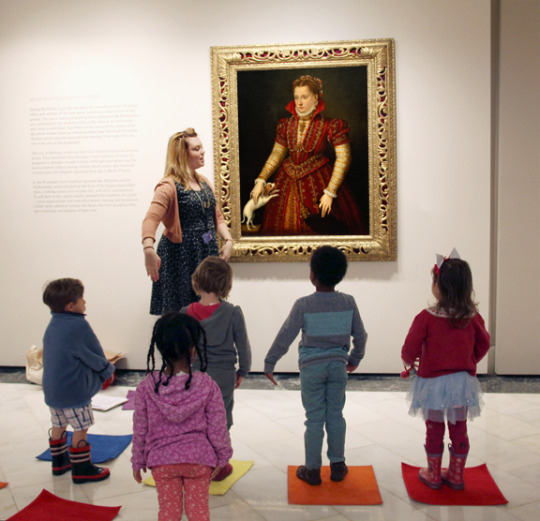
Artworks often tell a story. That’s why many routines make use of this narrative power to engage students. In Beginning / Middle / End, artists are considered storytellers, and students try to figure out how the picture of a specific moment in time may refer to a whole story. Then, they use evidence based on what they see to imagine what happened before and what might happen after. Adrienne noticed that “children are innate storytellers, and this exercise allows them to express their creativity while practicing their evidential reasoning skills”.
Headlines i s a perfect routine to continue the work done with Beginning / Middle / End. For students, the exercise - that consists of generating titles for narrative works of art - is a way to feel engaged and get excited by the stories pictures may tell. For the educator, Headlines acts as an assessment tool enabling us “to see what students have synthesized and are taking away about the ‘essence’ of this artwork”.
See / Think / Wonder is the core routine of Harvard Project Zero and used often at NMWA. Three basic questions are used to enhance observation and interpretation skills: “What do you see?”, “What do you think about that?”, “What does it make you wonder?”. This is a helpful observation technique and makes sense out of objects in a variety of contexts that some teachers use it into their classrooms. In this case, the museum’s workshop become an opportunity for students to reinforce the practice of looking, inferring, and questioning in a new environment. For this reason, See / Think / Wonder is probably one of the most efficient art integration techniques.
Lastly, Colors / Shapes / Lines is particularly efficient way to start a conversation with young students, those with developmental challenges, or when students don’t seem receptive to the routines that are based on stories. As they focus on formal elements of art, students progressively enrich their descriptive vocabulary, while getting more familiar with the interpretation process.
Please visit Thinking Palette to get an overview of the practices.
Adrienne underlines that this practice is a very good way to discuss artworks in which color is essential, as in Amy Sherald’s paintings.

Amy Sherald, They Call Me Redbone but I’d Rather Be Strawberry Shortcake, 2009; Gift of Steven Scott, Baltimore, in honor of the artist and the 25th Anniversary of NMWA.
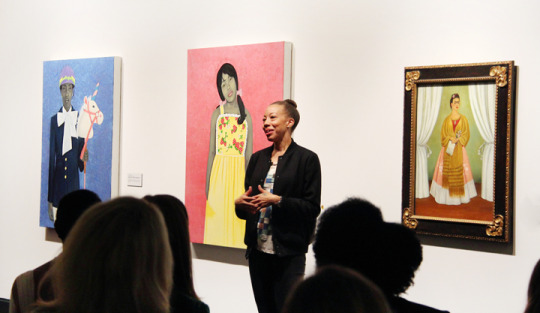
Amy Sherald at NMWA; Photo: Emily Haight, NMWA
More information about the exhibition is available in the article “Go Figure! Amy Sherald at NMWA” on the museum’s blog Broad Strokes.
Adapting to students needs
As well as thinking, creating is essential to learn, and the hands-on workshops are an integral part of ABC’s programs. NMWA was inspired by the Eric Carle Museum of Picture Book Art, a non profit organization working to inspire a love of art and reading through picture books in Amherst, Massachusetts.
The merging of visual and language arts is a great opportunity to keep up learning while considering the direct parallel between images and texts, and thus reinforce the link between the museum experience and academic curriculum. At NMWA, this concept has been implemented through an “artists’ books” workshop: individually or as a team, students create their own books to reflect and recall their visit. Since every one of them is unique, the artist book is also a way to encourage students to identify and best use their own abilities. Moreover, artists’ books also employs a flexible education format allowing students to freely describe their experiences, emphasizing images or texts.

We hope you will find these resources helpful to your own educational practice, either in the classroom or outside of the school setting. Please email [email protected] if you have any questions about this article or connecting to NMWA staff.
#CollaborativeEffect#language arts#visual art#project zero#art integration#DC Arts and Humanities Education Collaborative#visual arts
0 notes
Text
DC Collaborative Launches its Distance Learning Resource Database
Tuesday, March 24, 2020
The DC Collaborative and its partners launch the DC Collaborative Distance Learning Resource Database!
Quick Links:
DC Collaborative Distance Learning Resource Database
DC Collaborative Website
DC Collaborative COVID-19 Resource and Updates Center
The DC Collaborative would like to extend well wishes to educators, students and parents/ caregivers as the first day of DCPS Distance Learning begins. Though these times are not normal, we are contacting you with hope and optimism that you will experience joy at home with your loved ones.
As it is necessary for teachers to educate their students remotely and for parents/ caregivers to homeschool their children, the DC Collaborative and the greater arts and humanities education community of practice are here to assist! The DC Collaborative has rapidly responded in creating the following resource for our entire community, including students and educators in both the DC Public School and Public Charter School communities.
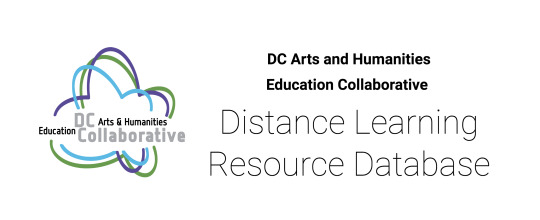
The DC Collaborative along with its organization and practitioner members as well as the DCPS Central Office Arts Team have compiled an online Distance Learning Resource Database, a list of online and downloadable arts and humanities education resources from our members. We already have more than 60 responses from our cultural institutions and practitioner/ teaching artist members! These resources encompass curricular guides, virtual field trips, and other educational activities to enhance students' at-home learning experiences.
View the Database!
Equity/ Access
We are increasingly concerned about student equity and our continued digital divide, especially during our current crisis. We recognize that not all families have access to technology and the Internet, and we are working on creating equitable solutions to provide our most marginalized students with resources. For now, please include downloadable materials so schools can, if possible, distribute the resources to students who do not have online access. We are inspired by our community coming together to ensure that students still have access to the arts and humanities learning experiences, even in a time of a health crisis. The creative community looks to uplift and enrich the residents of our District, even in a time of "social distancing" and look forward to sharing our collective resources and having our institutions open once again to serve you.
Get Involved!
Calling All Educators, Students, Parents/ Caregivers, Cultural Institutions and Practitioners/ Teaching Artists
We encourage teachers students and parents to utilize the database in their learning and for more members of the cultural community to participate!
Educators, Students, Parents/ Caregivers
View the Database! Peruse the online resources broken down by visual arts, performing arts and humanities and grade level. Each resource includes a description, the appropriate grade levels, curricular connections/ learning standards, and if the resource is printable/ downloadable.
Wish something else was included in the DC Collaborative's Distance Learning Resource Database? Fill out this survey OR email Clarissa Heartsfield, Manager of School Partnerships ([email protected]), to share what you would like to see included.
Complete the Survey!
Cultural Institutions and Practitioners/ Teaching Artists
Needs Assessment! We would like to hear from you regarding how COVID-19 has impacted the education programming at your organizations so far. We've been called upon by funders, public education system and DC government and other key community stakeholders to share the needs of the greater arts and humanities education community of practice. Fill out needs assessment survey here by C.O.B. Friday, March 27.
Complete the Survey! We are still collecting Distance Learning Resources! Together, let's help our schools provide digital and printable learning opportunities from our arts and humanities organizations. Submit your resources here OR reach out to Trés McMichael, Education Programs Manager ([email protected]), to brainstorm resources for inclusion in the database.
Submit Your Distance Learning Resources Here
Questions/ Suggestions?
Contact Tres McMichael, DC Collaborative Education Programs Manager- [email protected]!
#DistanceLearning#CollaborativeEffect#2020Creates#CollectiveImpact#ArtsEd#HumanitiesEd#ArtsandHumanitiesforEveryStudent
0 notes
Text
Speed Dating Event:
Submitted by: Jake Hahn, DC Collaborative Programs and Communications Intern Friday, November 1, 2019
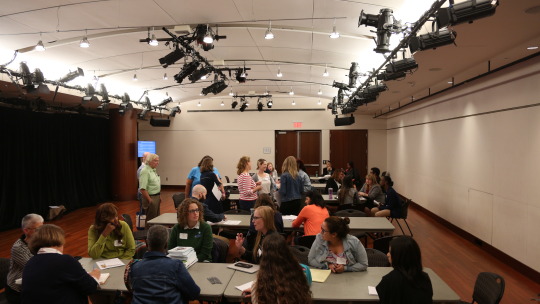
During the event, members had the opportunity to walk around and ask specific questions about curriculum objectives at the different schools.
On October 15, 2019, D.C. Arts and Humanities Education Collaborative held a speed dating workshop for local curriculum teams and members to come together for an opportunity to learn from one another and collaborate. The event, hosted by Shakespeare Theatre Company, kicked off with short presentations given by representatives from the local schools , allowing them to give a brief description of their curricular methodologies and objectives. After the presentations, members were given a chance to rotate through conversations with the curriculum representatives and ask questions in short “speed dating” style sessions.
Presentation Descriptions:
DCPS Secondary English Language Arts-
The secondary ELA curriculum presentation laid out a brief overview of the curriculum for both middle school and high school students. For middle school, the focus is understanding the qualities that make a hero in a community. High schools focus on studying the skills necessary to become a leader, weather that be in a workplace or in a classroom.Their high school experience culminates in the creation of action plans to take on projects of interest in their communities.
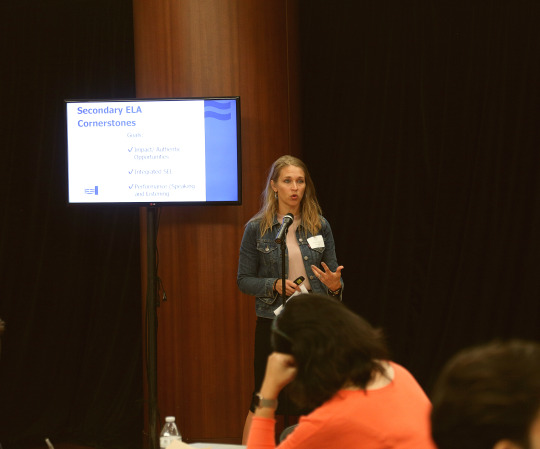
Abby Welsheimer from the DCPS Secondary ELA team shares about the gaps in community partnerships in various units across the curriculum.
DCPS Early Childhood Education -
The Early Childhood Education division of DCPS builds curriculum for early learners to public schools that house PreK programs. In addition to fostering a positive environment for the students to learn and grow in, they emphasize the need to provide activities promoting early literacy skills in young learners.
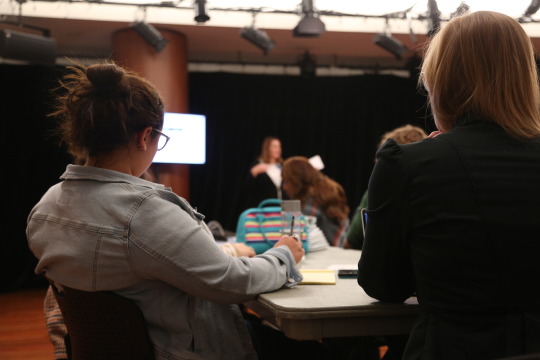
Members took notes on the curriculum shared by Robin Jones from the DCPS Early Childhood Education team.
Carlos Rosario PCS-
Carlos Rosario International Public Charter School provides high quality education for adults, primarily from D.C. immigrant communities. Their school draws students from all education backgrounds, and some having successful careers in the arts and other industries in their home countries. Carlos Rosario strives to offer them the credentials and experience they need to succeed here, in the new country they call home.

A representative from Carlos Roasio Public Charter School shares about the diverse cultural backgrounds and life experiences their adult students bring to the school.
Friendship Schools -
Friendship PCS strives to give students the option of all arts disciplines at their schools. With a standardized programming outline, they hold classes that range from studio art to theatrical. Friendship Public Charter Schools now houses an arts magnet school, Friendship Armstrong, replacing the former City Arts and Prep school.

Teriauna Duran from Friendship Public Charter Schools shares about some of the robust arts programs that her school supports.
Capital City Public Charter School -
Capital City Public Charter School enables a diverse group of students to meet high expectations, develop creativity, critical thinking, and problem-solving skills. Each grade level is exposed to the arts through various themes (social justice, immigration, etc.)

Joanna Lewton from Capital City Public Charter shares her school’s approach to arts integration.
DCPS Arts -
Mary Lambert (Director of Arts) and Katy Weatherly (Manager, Music) of DCPS gave a visual of the framework for the development of students with the arts. As well as, introducing multiple different programs that they would like to bring to classrooms.

Mary Lambert and Katy Weatherly from DCPS Arts share about their hopes for more expanded arts programs in all disciplines.
The full presentation can be viewed here. Please contact the Collaborative if you have questions about connecting to the presenters or suggestions of future topics for our “Speed Dating” events.
0 notes
Text
Story Bank: Early Childhood & Family Engagement Series
Submitted by: JaiAnn Haskins, DC Collaborative Communications Intern October 24, 2017
Early Childhood & Family Engagement: Findings from a Community Partnership
On October 24th, 2017 the DC Arts and Humanities Education Collaborative celebrated a successful community partnership with Imagination Stage, Sitar Arts Center, and the Spanish Education and Development Center. The panel discussed the findings in Early Childhood and Family Engagement from the community partnership. Over the course of the last year, these partners have explored successful community partnerships through a Theatre Communications Group Audience Revolution Cohort grant.

The panel was held at the Sitar Arts Center in NW, D.C. Panelists included Joanne Seelig of Imagination Stage, Cristina Cotte of the Spanish Education and Development Center, and Lorraine Robinson and Sylvia Zwi of Sitar Arts Center. David Markey, Arts Education Manager at the DC Commission on the Arts and Humanities acted as panel facilitator, allowing parents who participated in the year of programming to share their experiences.


Topics Discussed
How can community partnerships build family engagement in the arts? Why is family engagement in the arts important to a child's development? Date: Tuesday, October 24, 2017 Time: 4:30 p.m.-5:30 p.m. Location: Sitar Arts Center- 1700 Kalorama Rd NW, Washington, DC 20009
Recording
Missed out on the panel? View the video below!
youtube
View More Videos on our Youtube channel here!
Quick Links
Agenda
Panelist Bios
DC Collaborative
DC Collaborative YouTube Channel
Imagination Stage
Spanish Education and Development Center
Sitar Arts Center
Theatre Communications Group
DC Commission on the Arts and Humanities
#education#arts#ahfes#artseducation#DCCollaborative#CollaborativeEffect#artscenter#Member Feature#arts ed#News#general news
0 notes
Text
Thank You Volunteers!
Thank you to Whole Foods Market, our Volunteers, Shoppers, and anyone who helped spread the word about the 5% Community Giving Program benefitting Arts and Humanities for Every Student field-trips for more students! #Gratitude-- We are so appreciative of all of the support from our community and the opportunity that Whole Foods Market afforded the DC Arts and Humanities Education Collaborative with our 5% Day for equitable access to the arts and humanities for DC students.
Volunteers- We could not have done this without you. Thank you for encouraging people to shop and support the #ArtsAndHumanitiesForEveryStudent program. More students are going to go on more field-trips this year and that is all because of you!
We got to meet and personally thank hundreds of shoppers, parents, teachers, media, donors and community stakeholders for supporting our mission. Thousands more who just learned about our work for the first time thanks to our friends at each of DC's Whole Foods Markets.
We had an incredible outpouring of support from our staff, current and former board members, interns, members and educators-- volunteers who stood with us at each of the 4 DC Whole Foods Market stores getting to share the work they do and love on behalf of DC students. Thank you to each of you who helped, whether inviting and socializing the event through your work and social networks, greeting shopping, organizing a happy hour or just buying your groceries!
News4's Aaron Gilchrist, the "Theatre Kid" helped raise awareness about our work on NBC Washington, our friends at The Georgetowner taught us how to use Boomerang, and I got to welcome National Symphony Orchestra Maestro Gianandrea Noseda to the DC Arts and Humanities Education Collaborative on the The Kojo Nnamdi Show. A Heartfelt thank you! Looking forward to continuing to support more students and teachers and the arts and humanities education community in our 20th year!

Check out Part of the Day!
View us live at H Street Whole Foods Market
Check out our Twitter Whole Foods Collection!
Check Out Some Photos!












#ArtsAndHumanitiesForEveryStudent#ShopForACause#CollaborativeEffect#DCArts#202Creates#ArtsEd#HumanitiesEd#WholeFoodsMarket#WholeFoods#supporters#Volunteers#ThankYou#Thank You#Gratitude#general news
0 notes
Text
Expanding National Arts in Education Week, Whole Foods Market to Donate 5 Percent of Wednesday’s DC Sales to Benefit Underserved Youth’s Arts and Humanities Education
A portion of Wednesday, September 20th proceeds will fund equitable access for student transportation to arts and humanities institutions in DC
For Immediate Release
For More Information: Todd Schrecengost Metro Marketer, Whole Foods Market 202-573-0297 [email protected]
Lissa Rosenthal-Yoffe Executive Director, DC Collaborative 202-470-6467 x3, or 412-952-6017 (c) [email protected]

WASHINGTON, DC (September 13, 2017) – DC Arts and Humanities Education Collaborative will be the beneficiary of Whole Foods Market’s quarterly 5 percent Community Giving Day in Washington, DC on Wednesday, September 20th. Five percent of the day’s sales from all four current Washington, DC stores will benefit the DC Collaborative’s high-cost transportation needs for their ‘Arts and Humanities for Every Student’ legacy program. The funds will allow the DC Collaborative to expand their program’s reach to more DC public and public charter school students from all eight wards of the District. DC Collaborative is a Washington, DC-based non-profit that advances equitable access to high-quality learning opportunities in the arts and humanities for all DC public and public charter school students. Celebrating its 20th year, and in support of its 100+ cultural institutional members, the DC Collaborative believes that the arts and humanities, inclusive of music, visual arts, theater, dance, media arts, as well as languages and literature, and historical and philosophical inquiry into our past and human condition, are central to the education of every student. “Washington, DC is rich with world-class museums, dance, music and history that draw millions of tourists, yet so many of our youngest residents, our own DC students, may not get a chance to experience these cultural amenities,” said Lissa Rosenthal-Yoffe, executive director of the DC Arts and Humanities Education Collaborative. “The DC Collaborative works closely with its members to advance and provide enriching field-trips to DC public and public charter schools. Field-trips that its members’ produce that are tied closely to classroom curriculum.” “Do you remember the joy of a grade school field-trip to a museum, or a play, concert, or the ballet? Now is your chance to help DC students… and in the easiest way possible. Just do something you already do …go grocery shopping!” added Rosenthal-Yoffe. “The more you shop at DC’s Whole Foods Markets on September 20th, the more buses we can charter for more DC public and public charter students to experience transformative arts and humanities field-trips right here in their own hometown.” Shop Whole Foods Market Washington, DC Locations on Wednesday, September 20th:
• Foggy Bottom – 2201 I St. NW • H Street – 600 H St. NE • P Street – 1440 P St. NW • Tenleytown – 4530 40th St. NW
-###-
About DC Arts and Humanities Education Collaborative The DC Arts and Humanities Education Collaborative, together with its 100+ cultural intuitional members advocates and advances equitable access to high-quality learning experiences in the arts and humanities for all students and teachers in DC public and public charter schools. Since its founding in 1998, the DC Collaborative has served more than 600,000 public and public charter school students in all eight wards of the District of Columbia through its legacy program Arts and Humanities for Every Student (AHFES). As DC’s back-bone support arts and humanities education membership organization, the DC Collaborative leads collective impact and community awareness initiatives, professional development opportunities for educators and convenings and networking for DC’s arts and humanities education stakeholders. For information on how you can support Arts and Humanities for Every Student (AHFES) by shopping at DC Whole Foods Market stores on September 20th, please visit dccollaborative.org/wfm.
About Whole Foods Market® Founded in 1978 in Austin, Texas, Whole Foods Market (wholefoodsmarket.com, NASDAQ: WFM), is the leading natural and organic food retailer. As America’s first national certified organic grocer, Whole Foods Market was named “America’s Healthiest Grocery Store” by Health magazine. The company's motto, “Whole Foods, Whole People, Whole Planet”™ captures its mission to ensure customer satisfaction and health, team member excellence and happiness, enhanced shareholder value, community support and environmental improvement. Thanks to the company’s more than 87,000 team members, Whole Foods Market has been ranked as one of the “100 Best Companies to Work For” in America by FORTUNE magazine for 19 consecutive years. In fiscal year 2015, the company had sales of more than $15.4 billion and currently has more than 455 stores in the United States, Canada and the United Kingdom. For more company news and information, please visit media.wfm.com.
#ShopForACause#Collective Impact#CollaborativeEffect#Whole Foods Market#News#DC#DCArts#Fundraising#Arts and Humanities for Every Student#AHFES#Benefit#Volunteer#ArtsEd#202 Creates#Humanities#Arts#HumanitiesEd#Education#DCPS#BeacuseOfArtsEd#general news
0 notes
Text
Hear Art | See Music at the Kreeger Museum
AHFES Feature
Submitted by: Annelisa Crabtree, DC Collaborative Program Intern
June 27, 2017
On June 15th, H.D. Cooke Elementary School went to the Kreeger Museum to participate in the Hear Art | See Music program. The program highlighted the cultures of the Baga and Bamana from West Africa.
The program focuses on both visual art and music to highlight the parallels between repetition and patterns in both. The class began in the Kreeger Library where they examined and discussed two masks from Baga and Bamana. They focused on the use of repetition across aspects of the mask and connected it back to possible natural influences and purpose in the everyday lives of the Baga and Bamana.

The class spent time with a Teaching Musician and a Teaching Artist. In the drum circle, students learned dance rhythms, including the Kuku on djembe drums. The Teaching Musician connected the repetition that they had seen in the masks in the Library to the musical repetition they were experimenting with on the drums.
With the teaching artist, the students were asked to imagine a feeling and think of an animal that they felt symbolized that feeling. They then created masks that were representative of the animal and the feeling. The masks were made of wood, shells, sticks, and raffia grass. The students were very focused in their efforts and made some pretty extraordinary masks!

The Kreeger Museum's school programs are supported through generous donations, grants, and philanthropic institutions. To learn more about The Kreeger Museum's education programs, click here.
#artsed#KreegerMuseum#DCPS#DCarts#AHFES#AHFES feature#fieldtrip#DCCollab#HearArtSeeMusic#collaborativeeffect#humanitiesed#elementaryed#visual arts
0 notes
Text
Connecting to Curriculum Series: AHFES Hours at the National Museum of Women in the Arts
Submitted by: Eva Steinhardt, DC Collaborative Communications Intern June 12th, 2017
Last Tuesday, over thirty members of our community gathered at the National Museum of Women in the Arts for the first AHFES Hours session of the summer.
These sessions are designed to help guide our members in creating impactful arts and humanities experiences which can be included in our Arts and Humanities For Every Student program next school year. In the June 6th session, our focus was on curriculum connections in order to successfully incorporate the programs offered by our members into existing curriculum topics.

Our committed members learning about DCPS’s curricular priorities
We listened to presentations by our DCPS partners including Nathan Diamond (DCPS Arts), Jennifer Jump, and Raymond Cummings (from English Language Arts). Our speakers provided detailed insight into the process of curriculum creation. Through an examination of specific K-12 curricula, our members were able to come away from these presentations with a strong sense of DCPS priorities and, importantly, how to supplement those priorities through their educational programming. Following the presentations, the group split into breakout sessions where our members were able to discuss their individual programs and ask questions of the DCPS staff.

One of our breakout sessions in NMWA’s beautiful library
The National Museum of Women in the Arts provided us with refreshments, opening remarks, and an inspiring setting in which to facilitate important conversations between DC cultural institutions and DCPS curriculum builders. Additionally, after the meeting concluded, our attendees were given the chance to explore the museum free of charge until closing.

A huge thanks to our friends at NMWA for hosting this event!
We are so grateful to all our members who attended our first AHFES Hours. Everyone contributed to the inspiring and productive session. We were reminded once again how fortunate we are to be the facilitators of this collaborative.
Our next AHFES Hours will focus on Social Studies curriculum and will be held at our headquarters on F Street on June 13th - please click here to RSVP.
We look forward to seeing you all again soon!
#collectiveimpact#collaborativeeffect#artsed#humanitiesed#news#DCarts#Gratitude#publicschoools#DCPS#education#artsandhumanitiesforeverystudent#AHFES news
0 notes
Text
Do More 24: Why do I support the DC Arts and Humanities Education Collaborative?
Submitted by: Annelisa Crabtree, DC Collaborative Intern Tuesday, June 6, 2017
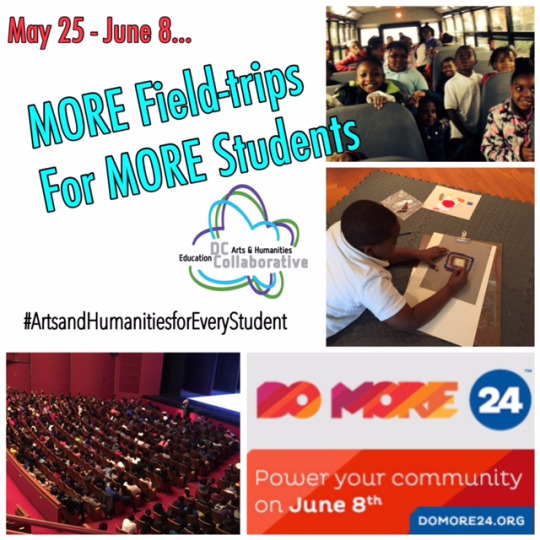
Why do I support the DC Arts and Humanities Education Collaborative?
My support for DC Collaborative officially started a little over 24 hours ago: as their newest intern! I am excited and honored to be working at a place that is doing such important work for DC students and the arts and humanities as a whole. I truly believe that seeing and reading and listening to art in all its mediums, in and out of the classroom, makes an impact and opens people up to different worlds and ways of thinking.
Start Your Activism @Home…
The DC area is home for me. I grew up here and some of my most impactful experiences were related to arts and culture. Whether it was Theater in the Woods at Wolf Trap, walking sweaty but excited through the Smithsonian Folklife Festival, visiting an instrument petting zoo at the Kennedy Center, or a new exhibit at the National Gallery of Art, the exposure taught me about other people, other cultures, ignited my imagination, and showed me new ways to express myself.
I ended up going away to college and studying music, so clearly, those excursions and experiences had some sort of impact on me. And I recognize I was extremely lucky to not only attend those activities outside of school, but also to take part in art, literature, and musical classes and excursions through school. After graduating, it was important for me to not only come back to this area for its rich cultural and artistic life, but to give back to the community that provided me with so much.
Make your donation now through June 8th by clicking here.
That is how I came to be at DC Collaborative. It is incredibly inspiring to work with the staff, members, and educators to ensure quality and equitable access to the arts and humanities for students across DC. And in doing so, I can do my part to give back to the community and work to provide others with the experiences that every student deserves and indelibly shaped me.

Annelisa at a Kennedy Center instrument petting zoo circa 2001.
~Annelisa , Intern, DC Arts and Humanities Education Collaborative
To donate to the DC Collaborative through June 8th: DoMore24
For more information about the DC Collaborative: www.dccollaborative.org
#domore#artsandhumanitiesforeveryone#collectiveimpact#Startyouractivism#publicschools#DCCollab#collaborativeeffect#news#ArtsandHumanitiesForEveryStudent#artsed#humanitiesed#supporter features
0 notes